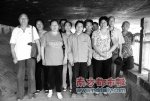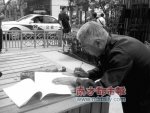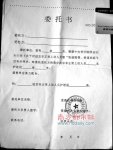oliveryty
Member
- Joined
- Dec 11, 2009
- Messages
- 141
- Reaction score
- 45
- Location
- linyi, shandong, China
- Gender
- Male
- Political Leaning
- Slightly Liberal
Underground Prison against Petitioners Run by A Security Company in Beijing: China’s Stabilization
Mr Wen Jiabao, China’s Premier, talked at the UN in New York about the universial values, namely, the human rights and freedom. But do you know what is happening in China?
A security company named “An Ding Yuan” in Beijing is rising, whose main business is detaining and escorting the petitioners from the provinces. It sets up underground prisons and contrasts with local governments.
Image---
Petitioners around the Beijing Nanzhan railway station. Most of them have been detained by the An Ding Yuan. Some have been detained for more than once.
Image---
Dai Yuequan, a petitioner, has appealed against the An Ding Yuan on its illegal detention in the underground prison, but received no reply.
Image---
“Escorting vehicle” used by the An Ding Yuan for the sending the petitioners back to the provinces.
Image---
Contract text between the An Ding Yuan and a local government.
It reads:
Power of Attorney (NO:XXXX)
The Trustor:_______________________
The Trustee:_______________________
Business of Trusting: Hereby, the Gov’t of ______(City), ______(Province), in accordance with the “Quick Claim and Quick Disuasion” aganst the Abnormal Petitioners issued by XXXXXXX(omitted authority), commissions the Trustee escorting ____(number) petitioner(s) from ________________(city, province) back.
Wish you do well in the bussiness.
Attached with: Table of Abnormal Petitioners
The Trustor:
Signature of the representative:
Contract:
The Trustee:
Signature of the representative:
Contract:
Date: ______________________
Points of the article:
1. Nightmare of the petitioners: powerless resistance
2. Background of the An Ding Yuan: a peasant from Hebei province controls the fate of the petitioners?
3. Contracted “stabilization”: underground prison
Long Zhi, Yang Yipei, journalists of Southern Matropolitan, from Beijing, Guangxi, Fujian, Hebei, Hunan
A security company named “An Ding Yuan” is rising in Beijing. In several years, the Beijing An Ding Yuan Security and Prevention Technology Service Co. LTD (the An Ding Yuan hereafter) has received many honors as the top company in the security industry in China.
But more and more investigations conducted by the media show that the major service provided by the An Ding Yuan is detaining and escorting the petitioners in Beijing from the provinces. It is believed that this rising security company has set up many underground prisons in Beijing, and it contrasts with local governments for detaining and sending back the petitioners. Violence is used against the petitioners by the An Ding Yuan.
Liao Wang (Outlook) , a weekly news magazine run by the Xinhua News Agency, has criticized the underground prisons by citing an authoritative report that there are 73 sites in Bejing reserved by the provincial and local governments for detaining the petitioners, among which 57 sites are run by the local governments (the prefectures and the cities), accounting for 78%....
Who granted the “An Ding Yuan”s the power to detaining the people?
For half a year, journalists of the Southern Metropolitan, a Guangzhou based newspaper, made a thorough investigation on the concealed “business” of the An Ding Yuan...
Part 1. Nightmare of the Petitioners: Powerless Resistance
How is the An Ding Yuan Nightmare hitting the petitioners? What happens to them in the underground prisoner? Behind the wantonly deeds of detaining and sending back the petitioners, who is the client of the An Ding Yuan?
A: The Story of Zhang Yaochun, a Policewoman
Policewoman petitoner sent to the underground prison
Three days after arriving Beijing, Zhang Yaochun went for the Beijing Office of Guangxi Zhuang Ethnic Autonomous Region after received a phone call. Along with her was Lin Difen, a petitioner from Zhanjiang, Guangxi.
The Guijing Hotel (or Guangxi-Beijing Hotel), between the Shuangjing Bridge and Guomao Bridge, is where the Beijing Office of Guangxi locates. It is closed, and you have to cross an iron gate to enter or exit, which is just against the up-pass with endless traffics..
On Nov. 16, 2009, Beijing was under a cold whether of minus five degree celsius. When Zhang Yaochun came to this Guijing Hotel, she felt nothing wrong, but she was vigilant and had Lin Difen left in a small hotel outside the gate of the Guijing Hotel.
Before 2000, Zhang Yaochun was a police working in the Household Registry Office of the Public Security Bureau of Hepu County. And earlier she had been working in the Interior Security Office for two years, in charge of the gun registry and filing. She found it surprising that the guns were ill-managed, that some cadres even sold guns to the private patrons... ①
In an administrative checking, Zhao Yaochun reported the facts to the “Checking Group”, and submitted a written material. She was then removed from her office and them dismissed with an excuse of “unqualification”.
In 2001, the Southern Weekend reported this event. But things did not change while Zhang Yaochun’s situation got harder as she was now fighting against the whole insterest group. What she had revealed were proved and desposed one by one, but her own job problem was not settled at all. What’s more, in 2007 Summar, one of her former colleague refused to give her her second generation ID card. She became an identity-less citizen in this country.
Since the first visit to Beijing for petition, Zhang Yaochun had dealt with the “Beijing Office” officials for countless times, and it was the charging official named Zhu who called her for interview this time.
She came as called to find herself at stake: besides officials from Beihai, Guangxi, two more plain-clothed police were waiting for her at the mouth of lane--- those who to catch her appeared. She tried to run off, but failed with the mouth of the lane was blocked by men.
What was warting for her was a white Iveco, with words on the vehicle--“An Ding Yuan Escorting”. Two young men in black uniform rushed out. The uniform was so acquainted with Zhang. It was completely similar with that of the sepecial police, only with the words at the arm to be “special service”.
This was the first time when the An Ding Yuan was known to the petitioner Zhang Yaochun. Five months later, when she was cought once again by the An Ding Yuan, she even talked with one of the “special service” men well-acquainted.
In the vehicle, Zhang asked: “Where are you going to send me to?”
He replied: “You will know later.”
Zhang protested: “I have the right to know where I am going. You are violating my human rights.”
Two of the “special service” men warned her: Death or silence.
The “Beijing Office” officials watched all of the process, Zhang remembered, they even helped to push her into the vehicle.
But they are not only on colaboration, but also in contracting. They called for the An Ding Yuan.
They had reached an agreement earlier the local government contracted with the An Ding Yuan for escorting the petitioners. And this kind of contracting is the most ugly but profitable business in An Ding Yuan.
The “prison vehicle” was taking Zhang Yaochun afar, and one hour later, they arrived at a place that had no road sign at all. Zhang found an arrow with words of “Beijing-Tianjin High-speed Railway”, and sign for “Fourth Ring South” throught the window of the vehicle. Around is ragged factories and warehouses, as well as trees. It was frightening quite.
At the evening, the vehicle stopped at a building with words “Kai An Da Reservation Warehouse” written. It was a ragged factory with a two-storey building inside and four small iron gates around, painted red.
Mr Wen Jiabao, China’s Premier, talked at the UN in New York about the universial values, namely, the human rights and freedom. But do you know what is happening in China?
A security company named “An Ding Yuan” in Beijing is rising, whose main business is detaining and escorting the petitioners from the provinces. It sets up underground prisons and contrasts with local governments.
Image---

Petitioners around the Beijing Nanzhan railway station. Most of them have been detained by the An Ding Yuan. Some have been detained for more than once.
Image---

Dai Yuequan, a petitioner, has appealed against the An Ding Yuan on its illegal detention in the underground prison, but received no reply.
Image---
“Escorting vehicle” used by the An Ding Yuan for the sending the petitioners back to the provinces.
Image---

Contract text between the An Ding Yuan and a local government.
It reads:
Power of Attorney (NO:XXXX)
The Trustor:_______________________
The Trustee:_______________________
Business of Trusting: Hereby, the Gov’t of ______(City), ______(Province), in accordance with the “Quick Claim and Quick Disuasion” aganst the Abnormal Petitioners issued by XXXXXXX(omitted authority), commissions the Trustee escorting ____(number) petitioner(s) from ________________(city, province) back.
Wish you do well in the bussiness.
Attached with: Table of Abnormal Petitioners
The Trustor:
Signature of the representative:
Contract:
The Trustee:
Signature of the representative:
Contract:
Date: ______________________
Points of the article:
1. Nightmare of the petitioners: powerless resistance
2. Background of the An Ding Yuan: a peasant from Hebei province controls the fate of the petitioners?
3. Contracted “stabilization”: underground prison
Long Zhi, Yang Yipei, journalists of Southern Matropolitan, from Beijing, Guangxi, Fujian, Hebei, Hunan
A security company named “An Ding Yuan” is rising in Beijing. In several years, the Beijing An Ding Yuan Security and Prevention Technology Service Co. LTD (the An Ding Yuan hereafter) has received many honors as the top company in the security industry in China.
But more and more investigations conducted by the media show that the major service provided by the An Ding Yuan is detaining and escorting the petitioners in Beijing from the provinces. It is believed that this rising security company has set up many underground prisons in Beijing, and it contrasts with local governments for detaining and sending back the petitioners. Violence is used against the petitioners by the An Ding Yuan.
Liao Wang (Outlook) , a weekly news magazine run by the Xinhua News Agency, has criticized the underground prisons by citing an authoritative report that there are 73 sites in Bejing reserved by the provincial and local governments for detaining the petitioners, among which 57 sites are run by the local governments (the prefectures and the cities), accounting for 78%....
Who granted the “An Ding Yuan”s the power to detaining the people?
For half a year, journalists of the Southern Metropolitan, a Guangzhou based newspaper, made a thorough investigation on the concealed “business” of the An Ding Yuan...
Part 1. Nightmare of the Petitioners: Powerless Resistance
How is the An Ding Yuan Nightmare hitting the petitioners? What happens to them in the underground prisoner? Behind the wantonly deeds of detaining and sending back the petitioners, who is the client of the An Ding Yuan?
A: The Story of Zhang Yaochun, a Policewoman
Policewoman petitoner sent to the underground prison
Three days after arriving Beijing, Zhang Yaochun went for the Beijing Office of Guangxi Zhuang Ethnic Autonomous Region after received a phone call. Along with her was Lin Difen, a petitioner from Zhanjiang, Guangxi.
The Guijing Hotel (or Guangxi-Beijing Hotel), between the Shuangjing Bridge and Guomao Bridge, is where the Beijing Office of Guangxi locates. It is closed, and you have to cross an iron gate to enter or exit, which is just against the up-pass with endless traffics..
On Nov. 16, 2009, Beijing was under a cold whether of minus five degree celsius. When Zhang Yaochun came to this Guijing Hotel, she felt nothing wrong, but she was vigilant and had Lin Difen left in a small hotel outside the gate of the Guijing Hotel.
Before 2000, Zhang Yaochun was a police working in the Household Registry Office of the Public Security Bureau of Hepu County. And earlier she had been working in the Interior Security Office for two years, in charge of the gun registry and filing. She found it surprising that the guns were ill-managed, that some cadres even sold guns to the private patrons... ①
In an administrative checking, Zhao Yaochun reported the facts to the “Checking Group”, and submitted a written material. She was then removed from her office and them dismissed with an excuse of “unqualification”.
In 2001, the Southern Weekend reported this event. But things did not change while Zhang Yaochun’s situation got harder as she was now fighting against the whole insterest group. What she had revealed were proved and desposed one by one, but her own job problem was not settled at all. What’s more, in 2007 Summar, one of her former colleague refused to give her her second generation ID card. She became an identity-less citizen in this country.
Since the first visit to Beijing for petition, Zhang Yaochun had dealt with the “Beijing Office” officials for countless times, and it was the charging official named Zhu who called her for interview this time.
She came as called to find herself at stake: besides officials from Beihai, Guangxi, two more plain-clothed police were waiting for her at the mouth of lane--- those who to catch her appeared. She tried to run off, but failed with the mouth of the lane was blocked by men.
What was warting for her was a white Iveco, with words on the vehicle--“An Ding Yuan Escorting”. Two young men in black uniform rushed out. The uniform was so acquainted with Zhang. It was completely similar with that of the sepecial police, only with the words at the arm to be “special service”.
This was the first time when the An Ding Yuan was known to the petitioner Zhang Yaochun. Five months later, when she was cought once again by the An Ding Yuan, she even talked with one of the “special service” men well-acquainted.
In the vehicle, Zhang asked: “Where are you going to send me to?”
He replied: “You will know later.”
Zhang protested: “I have the right to know where I am going. You are violating my human rights.”
Two of the “special service” men warned her: Death or silence.
The “Beijing Office” officials watched all of the process, Zhang remembered, they even helped to push her into the vehicle.
But they are not only on colaboration, but also in contracting. They called for the An Ding Yuan.
They had reached an agreement earlier the local government contracted with the An Ding Yuan for escorting the petitioners. And this kind of contracting is the most ugly but profitable business in An Ding Yuan.
The “prison vehicle” was taking Zhang Yaochun afar, and one hour later, they arrived at a place that had no road sign at all. Zhang found an arrow with words of “Beijing-Tianjin High-speed Railway”, and sign for “Fourth Ring South” throught the window of the vehicle. Around is ragged factories and warehouses, as well as trees. It was frightening quite.
At the evening, the vehicle stopped at a building with words “Kai An Da Reservation Warehouse” written. It was a ragged factory with a two-storey building inside and four small iron gates around, painted red.
Last edited:
